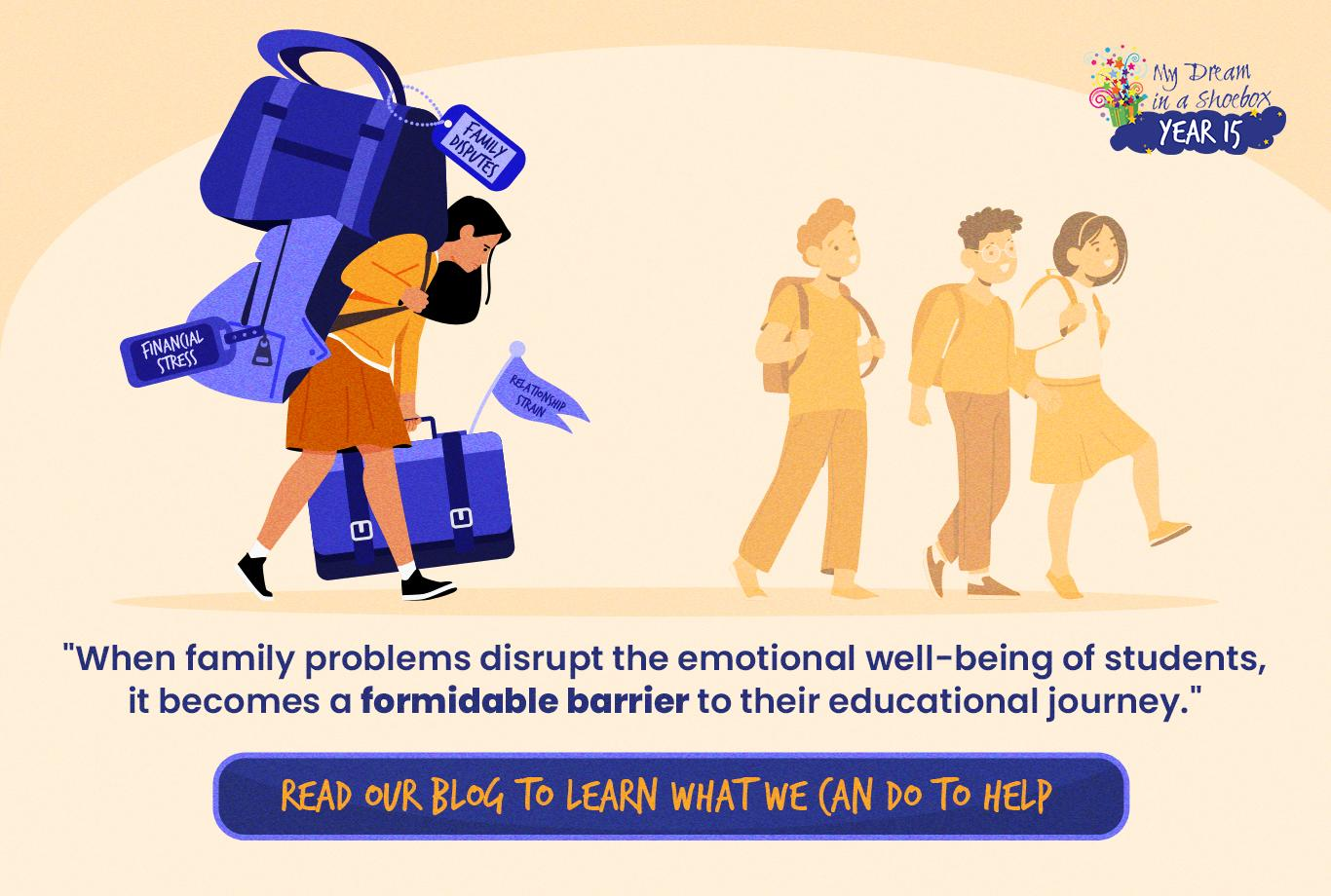How Do Family Problems Affect Students in The Philippines?

Students’ mental health issues, particularly when influenced by family problems, often remain invisible beneath the surface of daily school routines.
The struggles that students may face within their families, such as strained relationships, financial difficulties, or domestic conflicts, can significantly impact their emotional well-being.
Unlike physical ailments, mental health issues are less tangible and may go unnoticed by educators, peers, and even the students themselves. This invisibility can lead to a lack of understanding and support, increasing the challenges these students face.
Raising awareness about the challenges students face, specifically related to family problems, is crucial for fostering a supportive environment. By shedding light on these issues, we can eliminate the stigma surrounding students’ mental health and encourage open conversations.
Educators, parents, and peers can be better equipped to recognize signs of distress and offer appropriate assistance. Additionally, creating awareness helps in destigmatizing seeking professional help or talking to school counselors, enabling students to access the necessary resources to address their mental health concerns, and ensuring they get the necessary assistance to excel both academically and personally.
The Student’s Mental Health
Family problems impact more than one aspect of students’ lives, but it has a substantial effect on their mental health condition. The emotional toll of witnessing family disputes, experiencing financial stress, or enduring the strain of broken relationships can be overwhelming for young minds. Based on a study in 2023, the burden of these issues can prevent students in the family from receiving emotional support, as well as having difficulty expressing their emotions, which can cause mental health problems.
Mental health is crucial for academic success. When family problems disrupt the emotional well-being of students, it becomes a formidable barrier to their educational journey. In the Philippines, there is a growing recognition of the need to address mental health concerns among students, with initiatives aimed at providing counseling services and creating a supportive environment within educational institutions.
A List of How Family Problems Affect Students in The Philippines
Each household is distinct from one another, and different family environments can have diverse consequences and impacts on their members. However, these are some of the effects that family issues can have on students.
Overall Academic Performance: Family problems can lead to a decline in academic performance as students struggle to concentrate on their studies. The emotional turmoil at home can be a significant distraction, hindering the ability to focus on lessons and assignments.
Attendance Issues: Students facing family problems are more likely to have irregular attendance. The stress and emotional strain they experience at home may lead to demotivation and lack of enthusiasm that could result in frequent absenteeism, impacting their overall participation in school activities.
In some cases, students can also be in an unfortunate spot to take care of a loved one. This can lead to increased responsibilities at home, making them miss classes and requirements.
Behavioral Challenges: Family problems often bring about challenging and unproductive behaviors among students. Due to the emotional load they might carry from their home environment, they may exhibit signs of irritable mood, diminished interest in activities, fatigue, difficulty concentrating, decreased attention, and difficulty sleeping according to research from 2022.
Social Isolation: Students dealing with family issues may withdraw from their peers, feeling isolated and unable to connect with others. This social isolation can further exacerbate their emotional struggles.
Lack of Emotional Support: A stable and supportive family environment is crucial for a student’s emotional well-being. Family problems can deprive students of this necessary support, leaving them vulnerable and less equipped to handle the pressures of academic life.
Loss of Confidence: The weight of family problems can chip away at their self-esteem, making them question their abilities and hindering their belief in their success.
Bridging the Gap
Remember, family problems are not the only obstacle Filipino students face on their educational journey. As our previous blog on the effects of inflation highlighted, rising costs of living and educational materials can also play a factor in the daily lives of families and students.
Here are several methods you can use to bridge the gap:
Raising Awareness: Spread awareness about the prevalence and consequences of family problems on students. Initiatives that educate communities about the importance of a supportive family environment can help create a more empathetic society.
Supportive School Programs: Support school programs that focus on mental health and emotional well-being. Schools and their counseling department can play a crucial role in providing a safe space for students to discuss and address their challenges.
Community Counseling Services: Promote the availability of counseling services within communities. Accessible mental health support can make a significant difference in the lives of students facing family problems.
As mentioned previously, by shedding light on these issues, we can eliminate the stigma surrounding students’ mental health and encourage open conversations on supporting them.
Organizations like My Dream in a Shoebox aim to bridge the gap through our initiatives, like providing affordable school supplies and technology access and empowering students to overcome these hurdles.
By donating to MDIAS, you directly contribute to students’ overall well-being. Your support enables them to focus on their education, empowering them to reach their full potential.
Here are some ways you can assist students by donating to My Dream in a Shoebox:
- Support a scholar’s education for one year which can provide stability for the student and alleviate the financial burden of school costs, making it easier for the student to focus more on their studies and potentially positively influence their mental health.
- Dream Kits, which contains school supplies and tools that will provide them with the necessary resources to further their education.
- Educational Hubs (E-Hubs) supply an adopted school community with functional laptop computers, a reliable internet connection, and printing equipment.
Together, we can create a brighter tomorrow and bridge the gap for the next generation. Get involved, change lives, and pledge your support today!

 facebook.com/mydreaminashoebox
facebook.com/mydreaminashoebox instagram.com/mydreaminashoebox
instagram.com/mydreaminashoebox